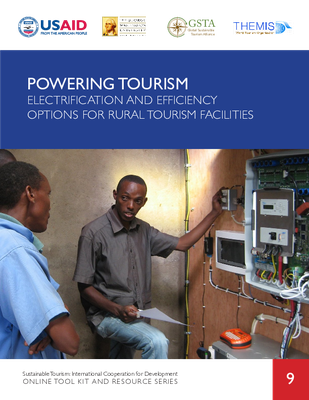ST9. Powering Tourism - Electrification And Efficiency Options For Rural Tourism Facilities
Powering Tourism provides information to help tourism professionals understand and evaluate the range of options for meeting their off-grid energy needs, highlighting efficient and sustainable use of energy. The guide provides a seven-step approach to guide the reader through the process of creating a reliable and affordable energy system by working with staff and visitors, equipment vendors, installers, financial institutions, and energy service providers. This manual is from a set of nine courses on Sustainable Tourism that have been developed by George Washington University as a result of compiling the lessons and best practices from the USAID Global Sustainable Tourism Alliance (GSTA) program, and other tourism development experiences. The courses train students, practitioners, donor agency representatives, and others working in related fields to understand and develop tourism and its role in international development. All the course materials are public access and also can be found inside the USAID NRM&D Learning Management Center. Your registration in these courses will allow you to actively participate in discussions of the material, and to take quizzes to check yourself for understanding at the end of each course. Each of the nine courses are offered free on a non-academic credit basis and offer a Certificate of Completion from USAID. Participants may take these courses to build your own knowledge of the field of tourism and development.The target audience for this manual, Powering Tourism - Electrification And Efficiency Options For Rural Tourism Facilities, includes professionals working on tourism-related projects in developing countries, including staff from donor and government agencies, non-governmental organizations, consulting firms, universities, businesses, and other entities.
https://biodiversitylinks.org/projects/completed-projects/gsta/powering-tourism-electrification-and-efficiency-options-for-rural-tourism-facilities/view
https://biodiversitylinks.org/projects/completed-projects/gsta/powering-tourism-electrification-and-efficiency-options-for-rural-tourism-facilities/@@download/image/image.png
File
ST9. Powering Tourism - Electrification And Efficiency Options For Rural Tourism Facilities
Author(s):
Pamela Baldinger et al,
USAID Energy Team, Bureau for Economic Growth, Education, & Environment
Publication Date: 2011
DOWNLOAD FILE
Powering Tourism provides information to help tourism professionals understand and evaluate the range of options for meeting their off-grid energy needs, highlighting efficient and sustainable use of energy. The guide provides a seven-step approach to guide the reader through the process of creating a reliable and affordable energy system by working with staff and visitors, equipment vendors, installers, financial institutions, and energy service providers. This manual is from a set of nine courses on Sustainable Tourism that have been developed by George Washington University as a result of compiling the lessons and best practices from the USAID Global Sustainable Tourism Alliance (GSTA) program, and other tourism development experiences. The courses train students, practitioners, donor agency representatives, and others working in related fields to understand and develop tourism and its role in international development. All the course materials are public access and also can be found inside the USAID NRM&D Learning Management Center. Your registration in these courses will allow you to actively participate in discussions of the material, and to take quizzes to check yourself for understanding at the end of each course. Each of the nine courses are offered free on a non-academic credit basis and offer a Certificate of Completion from USAID. Participants may take these courses to build your own knowledge of the field of tourism and development.The target audience for this manual, Powering Tourism - Electrification And Efficiency Options For Rural Tourism Facilities, includes professionals working on tourism-related projects in developing countries, including staff from donor and government agencies, non-governmental organizations, consulting firms, universities, businesses, and other entities.



